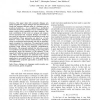41 search results - page 3 / 9 » Predicting Automatic Speech Recognition Performance Using Pr... |
ICASSP
2010
IEEE
13 years 8 months ago
2010
IEEE
Prosodic information has been successfully used for speaker recognition for more than a decade. The best-performing prosodic system to date has been one based on features extracte...
INTERSPEECH
2010
13 years 4 months ago
2010
We have developed an automated method that predicts the word accuracy of a speech recognition system for non-native speech, in the context of speaking proficiency scoring. A model...
JMM2
2007
13 years 9 months ago
2007
— This paper deals with automatic dialogue acts (DAs) recognition in Czech. Dialogue acts are sentence-level labels that represent different states of a dialogue, such as questio...
ICMI
2007
Springer
14 years 4 months ago
2007
Springer
Automatic detection of communication errors in conversational systems has been explored extensively in the speech community. However, most previous studies have used only acoustic...
ICMCS
2006
IEEE
14 years 3 months ago
2006
IEEE
Feature sets are broadly discussed within speech emotion recognition by acoustic analysis. While popular filter and wrapper based search help to retrieve relevant ones, we feel th...

